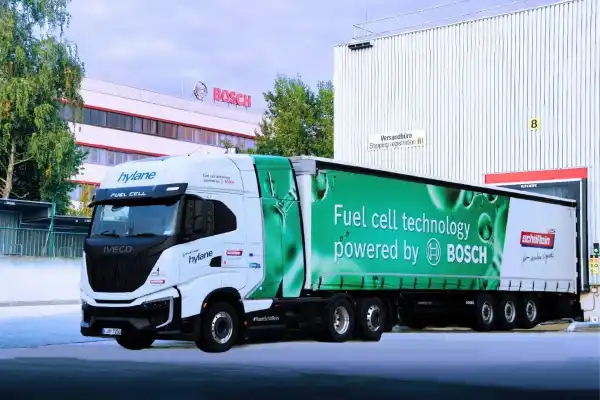Bosch has taken a significant step toward climate-friendly logistics by putting a fuel-cell electric truck into operation at its Nuremberg plant. The truck uses Bosch’s own Fuel-Cell Power Module (FCPM), recently nominated for the German President’s Future Prize, to operate completely electrically by converting hydrogen and oxygen into water and electricity. When powered with renewable hydrogen, the truck’s powertrain becomes climate neutral.

Plant manager Alexander Weichsel highlighted that this deployment is part of Bosch’s effort to reduce emissions in logistics and to demonstrate the viability of hydrogen technology in real-world operations. The truck primarily transports products within the plant and is expected to cover 12,000 kilometers per year.
Real-World Testing and Data Collection
The truck, an Iveco model operated by freight forwarder Schäflein and rented from Hylane, offers a range of up to 800 kilometers. Beyond reducing CO₂ emissions, the deployment is intended to gather operational data to improve future fuel-cell powertrain systems, including Bosch’s Compact 190 and Compact 300 models. Weichsel emphasized that smooth operation shows the fuel-cell system is ready for volume production, while acknowledging the importance of a robust hydrogen infrastructure for scaling the technology.
Technical Features of the FCPM Truck
The truck features five hydrogen tanks holding up to 70 kilograms at 700 bar pressure, delivering more than 200 kilowatts via its fuel-cell system. Its e-axle is powered by the fuel cell, supplemented by two central battery packs, producing a total system output of 400 kilowatts. With a gross weight of up to 44 tons, the truck offers long range, fast refueling comparable to diesel vehicles, and reliable performance unaffected by external temperatures. Large-scale FCPM production began in Stuttgart-Feuerbach in 2023, with the Bamberg plant supplying the fuel-cell stack and the Homburg plant providing components like the electric air compressor.
Bosch’s Hydrogen Strategy
Bosch has been actively promoting a hydrogen economy, developing technology for electrolyzers, hydrogen engines, and mobile fuel cells. The company recently introduced its Hybrion PEM electrolysis stacks, expanding its capabilities in clean energy solutions. Bosch aims to contribute to sustainable, electrified mobility while leveraging its expertise in sensors, AI, and connectivity to create user-friendly and efficient products.
